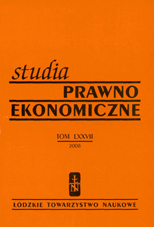Prawno-etyczne aspekty wykonywania zawodu mediatora z uwzględnieniem standardów europejskich
Ethical Standards for Mediators in the Context of Polish and European Regulations
Author(s): Maciej KoszowskiSubject(s): Law, Constitution, Jurisprudence
Published by: Łódzkie Towarzystwo Naukowe
Summary/Abstract: The issue of ethical standards for mediators is not expressly regulated by Polish law. Despite the fact that we have some legal rules for mediation in criminal and civil cases, there is not a complete regulation of ethical aspect of this profession. Furthermore, there is not an authority, which has power to set binding rules of ethical nature for mediators. However, above matter hasn’t remained without any interest. First of all the Minister of Justice passed a regulation concerns establishing Public Council for Alternative Methods of Dispute Resolution. This Council sets on 26 June 2006 ethical standards for mediators, but they are not binding and must be regarded only as some kind of recommendation. Secondly, some regulations are set by organizations which associate mediators, e.g. National Mediators’ Association. From the European law point of view we shall remember about the unbinding regulation passed by the European Commission on the conference, 2 July 2007: European Code of Conduct for Mediators. It’s also worth underlining that some acts regarding this matter are issued by Council of Europe, especially concern consumer aspects of ADR. On the other hand it’s pointed out that some ethical standards are incorporated into the Polish code for civil procedure. It was done by the amendment, 2005.These principles are so called “code principle”. The first of them is the basic principle that parties are free from any pressure from the mediator. Therefore they themselves decide whether to begin and to continue mediation as well as make a compromise. Next “code principle” is an obligation of the mediator to be impartial and uninfluenced by any party. The code rules also demand that the compromise between parties must be in accordance with the substantial law. We also can’t forgot about the fact that all, what was said during mediation, is only for the mediator’s information. It was confidential and must be kept secret even form the court. Another group of standards includes these ones which are not enacted in explicit manner by the legislator. The justification for them usually lies into morals or common sense. One of them concerns a neutral position of the mediator. This one is probably the most controversial. It means that the mediator is not allowed to make some proposals for settle a dispute. He is only an observer and he mustn’t put forward any solution, even if he recons that parties’ agreement is against the law. The second doubtful principle is the mediator’s obligation to pay attention to keep balance between two parties. The mediator also ought to guarantee parties a feeling of comfort and safety. He is obliged to provide an appropriate place for mediation with all facilities. It’s seem to be rational to oblige mediator to inform parties about all matters which are important for them, especially about his main ethical standards and rules affect his pay.
Journal: Studia Prawno-Ekonomiczne
- Issue Year: 2008
- Issue No: 77
- Page Range: 29-47
- Page Count: 19
- Language: Polish

